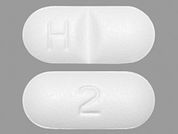Lamivudine-Zidovudine
Lamivudine/Zidovudine
What is Lamivudine-Zidovudine used for?
This product contains 2 drugs: lamivudine and zidovudine. It is used with other HIV medications to help control HIV infection. It helps to decrease the amount of HIV in your body so your immune system can work better. This lowers your chance of getting HIV complications (such as new infections, cancer) and improves your quality of life. Both lamivudine and zidovudine belong to a class of drugs known as nucleoside reverse transcriptase inhibitors (NRTIs). Lamivudine/zidovudine is not a cure for HIV infection. To decrease your risk of spreading HIV disease to others, continue to take all HIV medications exactly as prescribed by your doctor. Use an effective barrier method (latex or polyurethane condoms/dental dams) during sexual activity as directed by your doctor. Do not share personal items (such as needles/syringes, toothbrushes, and razors) that may have contacted blood or other body fluids. Consult your doctor or pharmacist for more details.
CHEMICAL NAME
DRUG TYPE
HivLamivudine-Zidovudine Prices
Searching for the lowest prices
What does Lamivudine-Zidovudine look like?
View all Lamivudine-Zidovudine Image Information (1)Lamivudine-Zidovudine Frequently Asked Questions
This section contains uses of this drug that are not listed in the approved professional labeling for the drug but that may be prescribed by your health care professional. Use this drug for a condition that is listed in this section only if it has been so prescribed by your health care professional.
This product may also be used to lessen the risk of HIV infection after contact with the virus (for example, due to a needle stick). Ask your doctor for more details.
IMPORTANT: HOW TO USE THIS INFORMATION: This is a summary and does NOT have all possible information about this product. This information does not assure that this product is safe, effective, or appropriate for you. This information is not individual medical advice and does not substitute for the advice of your health care professional. Always ask your health care professional for complete information about this product and your specific health needs.
